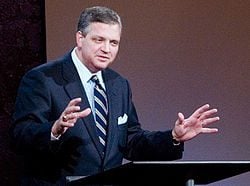It is a real pleasure to welcome to my blog today, Dr. Albert Mohler. Dr. Mohler should need no introduction to most of my readers, but I include a link to his biography for any who need to know more, as well as a link to my Together for the Gospel Conference Round Up Post.
This interview will be serialized over several days here on my blog.
Adrian
Al, thank you for joining us. Can you start by telling us in your own words about yourself, your family, and your ministry?
 Dr. Mohler
Dr. Mohler
Thank you, Adrian. I am honored to serve as president of The Southern Baptist Theological Seminary and Boyce College. Many different responsibilities grow out of that, but the seminary is the main focus of my ministry. First and foremost, I am a minister of the Gospel of Jesus Christ, committed to the preaching of God’s Word, to the health of Christ’s Church, and to the task of training the next generation of ministers and missionaries for service.
I am so very thankful for my family. Mary, my sweet wife of twenty-three years, is my faithful partner in ministry and life. She is also the wonderful mother to our children – Katie, who is age 17, and Christopher who is 14. I delight in my children, and together we enjoy our life as a family. I should note that we are also joined by (Richard) Baxter, our faithful beagle.
Adrian
How did you come to be one of America’s most influential evangelical leaders? What was the journey like?
Dr. Mohler
I appreciate your estimation of my ministry and influence, and I am not really certain how all this came about. Obviously, I trust that it is God’s will that these doors of opportunity and influence have opened, and I sincerely pray to be a good steward of those opportunities. I guess the best answer to your question about the journey is that I have seen doors open step-by-step, and every opportunity has seemingly led to yet others. I would hope that whatever influence I have is based in conviction and in a clear sense of evangelical identity.
At the present moment, issues of evangelical conviction and identity are very much up for grabs, and I do feel a sense of calling to address myself to those issues in a way that I hope will be both faithful and effective. Of course, as Woody Allen once observed, a significant percentage of success is due to simply showing up. It seems that the Lord has often placed me in what seems to be the right place at the right time in order to make at least some impact.
Adrian
Along the way, were there any setbacks, any hard times that you particularly learnt from?
Dr. Mohler
Well, the experience here at Southern Seminary was anything but smooth in the early years. I was elected president of this institution in 1993, just as the school reached its moment of greatest crisis. Clearly, my responsibility was to lead the school into a recovery of evangelical conviction, confessional faithfulness, and accountability to our churches. As you well know, this did not come without a fight, and my early years at Southern Seminary were marked by intense conflict—an experience I would not choose to repeat. Nevertheless, the last ten years have been incredibly sweet, and I am fully aware that the pain of those early years was necessary in order to know the satisfaction of the present.
During the hardest of those times, I was reminded again and again that, practically speaking, we are not assured of success. We do know that God’s cause will triumph in the end, but this does not mean that we can count on institutional viability or success in the eyes of the public. Thankfully, we have been given far more than we ever could have dreamed in terms of Southern Seminary’s current health, growth, and scope of ministry.
Adrian
How much are you a self-made man, and how much have you been influenced by others? Who would you say inspired you most in your spiritual journey so far? Who did you look at and think – I want to be like that?
Dr. Mohler
That is a very good question. I am certain that none of us is truly a self-made man. This is not to say that we are not called to study, labor, work, and personal struggle, but it is to say that none of these things, nor all of them together, make us who we are. I am absolutely confident that God uses significant individuals in our lives in order to mold us into the persons and ministers He wills us to be.
In my case, a succession of influences in my early years contributed to later developments. In particular, the Lord gave me two wonderful Christian parents who truly raised me in the nurture and admonition of the Lord.
Furthermore, I was blessed by a very healthy and vibrant experience in the local church, where I grew to understand the Gospel, embrace Christ, and find great satisfaction in being in the company of Christ’s people.
In my high school and college years, I was particularly influenced by Christian apologists—especially Francis Schaeffer. Schaeffer’s early works were a form of rescue for me when I was looking for an intelligent Christian response to the intellectual challenges of the 1970s. I was at that time living in South Florida, a place of rapid social change and clashing worldviews. It was a lot to take as a teenager, and I found that many of the Christians I trusted most in my local church were unprepared to address these issues. Schaeffer became an oasis for me, and I am incredibly indebted to him for his ministry through writing.
At a crucial stage in my seminary education, especially at the doctoral level, the influence of Dr. Carl F. H. Henry became crucial. Dr. Henry became a dear friend, a mentor, and a great encourager to me. His model of careful and faithful thinking, based in a clear affirmation of biblical authority, was a great encouragement to me and a substantial model for my own theological development and theological method.
To these I would simply have to add that the Lord has given me some of the most amazing friends. There is no way I could name them all, but I would draw particular attention to my brothers in Together for the Gospel. In particular, Mark Dever has been a friend for two decades now, and he has been one of the most fruitful and faithful partners in my own thinking over that entire expanse of time. Ligon Duncan and C. J. Mahaney round out that group, along with our friends who have joined us, John MacArthur, R. C. Sproul, and John Piper. Mark,
Lig, C. J. and I acknowledge together the influence these three men have had in our lives as well.
Continued in Part Two . . .















